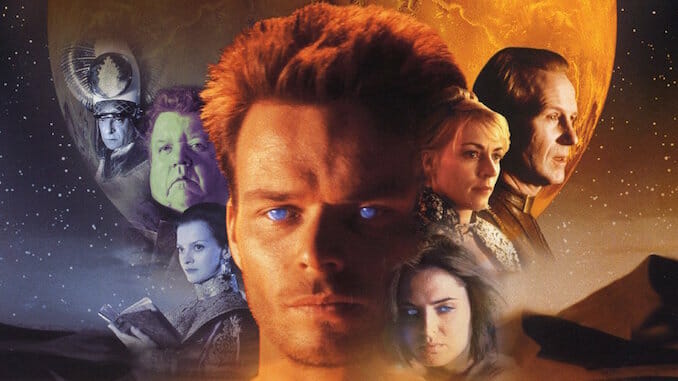TV Rewind: How Syfy’s Forgotten Dune Miniseries Made the Most of Herbert’s Complex Story

Editor’s Note: Welcome to our TV Rewind column! The Paste writers are diving into the streaming catalogue to discuss some of our favorite classic series as well as great shows we’re watching for the first time. Come relive your TV past with us, or discover what should be your next binge watch below:
![]()
Last month, the New York Times published a cover story titled “The Man Who Finally Made a ‘Dune’ That Fans Will Love.” Would you believe this wasn’t the first cover story about Frank Herbert’s esoteric sci-fi epic? Back in 2003, Warren Berger published an interview with several cast and crew members that worked on the then-airing follow-up to Syfy’s (née Sci-Fi Channel) 2000 adaptation Frank Herbert’s Dune. In the interview, Executive Producer Richard Rubinstein, who had previously worked on well-received TV adaptations of Stephen King’s The Stand and The Langoliers, says “there’s a wonderful marriage to be had between long, complicated books and the television miniseries.” He envisioned a future where the miniseries, which then-Syfy President Bonnie Hammer refers to as “a lost genre,” becoming a mainstay thanks to the rise in interest in epic, multipart features like Peter Jackson’s The Lord of the Rings trilogy.
Though the idea didn’t quite pan out for Syfy, both Frank Herbert’s Dune and Frank Herbert’s Children of Dune received several Emmy nominations, taking home three in total. Both series set rating records for the channel, doubling their previous highs. Frank Herbert’s Dune achieved crossover success in bringing in atypical audiences for the channel, including an older audience of male viewers as well as a high volume of women. In a way, this was Dune’s first big mainstream break, proof that slower, high concept sci-fi could rule the airwaves alongside space operas of a more directly adventuresome sort. So why, then, is Frank Herbert’s Dune so ill-remembered?
I don’t believe Dune is an unadaptable novel, as many critics have leveled against the recent movie—I think it comes down to a matter of priorities in filming. By and large, I quite enjoyed Denis Villeneuve’s 2021 take on Dune, but much of the movie’s reception seems inflated by worship of the film’s production value, which seems to have eclipsed the conversation in near totality. Frank Herbert’s Dune comes packaged with pitiful CGI (were the practical effects of Lynch’s movie that bad?), strange costuming decisions, and occasionally shoddy cinematography, but it undeniably carries with it the spirit of Dune. To new viewers, however, Frank Herbert’s Dune is dangerously close to seeming soapy, coming from a time where the phrase “made-for-TV” was a death knell. Despite this, these two series were not cheap to produce, accounting for a collective $40 million budget. That meant each part cost more than the average then-airing Star Trek: Enterprise episode, which are estimated to have been around $1.7 million. The steady increase in big budget TV and movies has, perhaps, given a skewed view on what “production value” really looks like—the more expensive productions become too big to fail, too glossy to deny, which leaves behind more (comparatively) humble works like Frank Herbert’s Dune. But does that necessitate that the more expensive version is the one that gets it right?
Dune is, at its core, a story about manipulation. The Bene Gesserit inserruct themselves in every sector of nobility, hoping to affix just the right dose of genetic material to bring about the Kwisatz Haderach. Houses Corrino and Harkonnen hope to lull House Atreides into false comfort to ultimately destroy them. Baron Harkonnen uses his brutish nephew Rabban as an easy scapegoat to Trojan Horse his more favored heir Feyd-Rautha into Arrakis as a more beloved ruler. Much of this is present in every screen adaptation of Dune so far, but, as of now, Frank Herbert’s Dune is the only of the three to touch on the messiah legend present in the Fremen culture, which is exploited (knowingly or otherwise) by Paul as a means to achieve Divine right over the people of Arrakis.
-

-

-

-

-

-

-

-

-

-

-

-

-

-

-

-

-

-

-

-

-

-

-

-

-

-

-

-

-

-

-

-

-

-

-

-

-

-

-

-








































